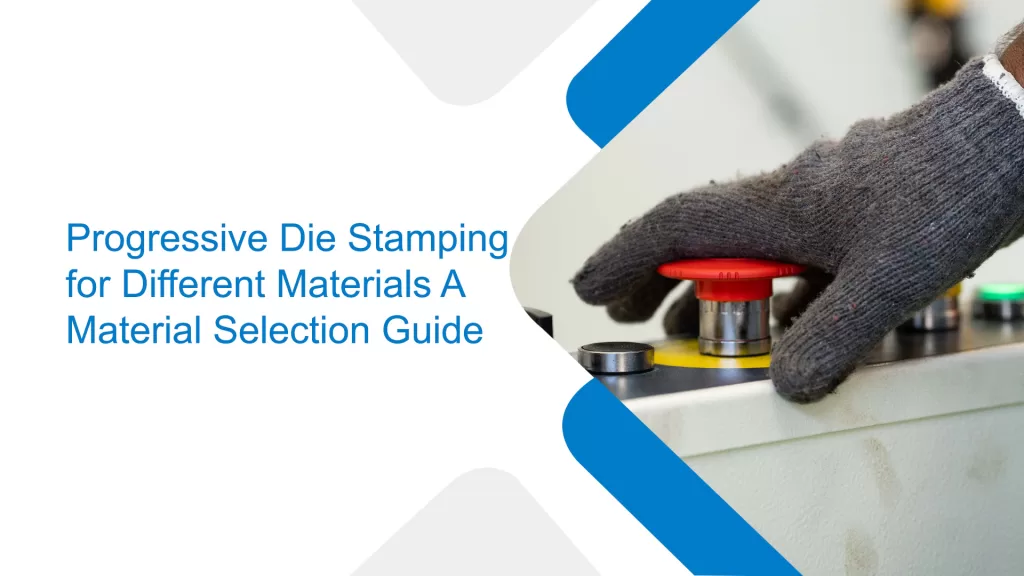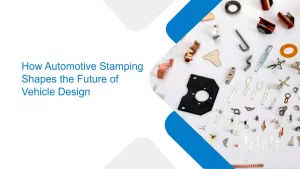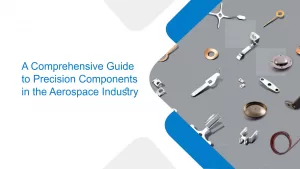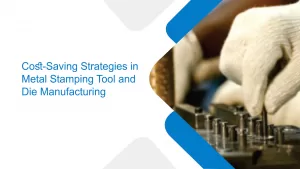Progressive Die Stamping for Different Materials: A Material Selection Guide
- Progressive Die Stamping |
- Sep 18, 2024

Progressive stamping is a precise, economical, high-volume automated metal forming technique that maintains product quality even at high production volumes. Progressive die stamping combines multiple processes into a single metal-forming process, enabling producers to create intricate products with the best metals for stamping without putting undue strain on the substrate or stopping output.
The complexity of the finished product and the qualities you want it to have are essential factors to consider when selecting the ideal progressive die-stamping materials. Here is the guide for material selection:
Factors to consider when choosing materials:
- Budget and material cost considerations:
The choice of material for metal stamping might be influenced by cost. For example, lower-performing materials are less expensive than metals and have excellent strength, formability, and resistance to corrosion.
For the final product to be practical, affordable, and within the project budget, electronic part manufacturers must balance the necessary material properties and the total cost of the raw material.
- Formability and workability of the substance:
The smoothness and calibre of a product’s surface finish are determined by how well the metal can be machined. Processing metals that are easy to cut or shape is usually less expensive. In contrast, metals that are difficult to machine may need extra finishing or specialized tools to get the right outcome.
Similarly, difficult weld metals may need extra preparation and process adjustments. In contrast, materials that are easy to weld require little work to produce products free of defects.
- Strength and longevity prerequisites:
The durability and strength of the die and its components are essential to guarantee effective and economical production in progressive die stamping. Constructing the die precisely to ensure proper force alignment and distribution is essential.
An incorrect force distribution or misalignment might cause early wear or failure. Tight tolerances during the production process guarantee that the parts fit together precisely, minimizing wear and tear.
Tool steels that have undergone proper heat treatment are harder and more resilient, which improves their capacity to bear stamping loads without deforming. The stamped component’s design should minimize sharp edges and other elements that could concentrate stress and cause die wear.
Common material used in progressive stamping:
- Steel:
Steel is a malleable progressive die-stamping material that is simple to shape and mold throughout the progressive stamping process. A wide range of geometries, including elaborate patterns and sophisticated features, can be produced using it. A wide variety of parts for various industries and applications can be produced because of this adaptability.
Steel is used in applications that call for strong, durable parts because of its excellent strength-to-weight ratio. Because of steel’s strength, intricate parts with tight tolerances may be produced using progressive stamping, and the pieces are guaranteed to survive the pressures and forces applied during the process.
Steel is a cost-effective material for progressive stamping since it is easily accessible and reasonably priced when considering other metals.
- Aluminum alloys:
It is a solid option for pieces that compromise strength and workability and is frequently utilized for structural components.
When choosing an alloy for progressive stamping dies, consider the needed strength, corrosion resistance, and stamped part complexity. Specific properties of each alloy can influence the final product’s quality and performance.
- Copper alloys:
The special qualities of copper alloys make them popular for progressive die stamping. Heat and electricity are well-conducted via copper alloys, such as brass and bronze. Applications requiring effective electrical conductivity and heat dissipation will benefit from this.
This is vital in progressive die stamping, where intricate geometries and accuracy are frequently needed. Strong machinability is a characteristic of copper alloys that can result in improved surface finishes and reduced tool wear.
Even while copper is not very hard by itself, it can be greatly strengthened while still having good toughness by alloying it with elements like zinc or tin. For high-stress applications, this qualifies it.
- Brass:
Brass can be preferred in several applications due to its many benefits for progressive die stamping. Longer tool life and more efficient stamping processes can result from brass’s relative ease of machining and shaping.
Brass is easily deformable without breaking because of its high flexibility. Because of this characteristic, complicated shapes can be produced with fewer flaws or cracks. Since stamped parts in these applications would be subjected to various environmental conditions, brass’s general good resistance to corrosion is advantageous.
Brass can be made more versatile in stamping processes by alloying it with other metals to modify its characteristics for particular uses.
Wrapping it up:
Eigen is one of the top companies offering assembly, tooling, and metal stamping services. We encourage you to peruse our resource library to gain additional knowledge regarding the significance of meticulous material selection during manufacturing. The core values of Eigen’s work ethic are quality, persistence, and valuable service. These are our main goals, and they influence every facet of our company.
Ujjwal handles crucial roles like AGM Marketing, researcher, and is an author for KDDL – Eigen. He currently works with Eigen for implementing proven techniques and strategies for marketing plans on online and offline platforms. An expert in efficiently executing SEO, SEM, email marketing, social media marketing, PR marketing, Print campaigns, etc. Ujjwal has coordinated an efficient marketing team on various creative campaigns and programmatic buying to support various digital cross-promotion efforts. Implement efficient search optimization strategies with the help of collateral material and metrics.
In his former years, Ujjwal has years of experience in a managerial role for several reputed companies. His years of experience combined with the flair of writing help him come up with result oriented strategies for Eigen.




